Empirical Investigation: Risk Management in Islamic Banks of Pakistan
VerifiedAdded on 2023/01/17
|13
|2168
|79
Project
AI Summary
This project presents an empirical investigation into the risk management framework employed by Islamic banks in Pakistan. The study aims to determine the efficiency of these banks in identifying and assessing risks, while also providing policy recommendations for improved risk management practices. The research delves into the unique challenges faced by Islamic banks, contrasting them with conventional banking systems, and explores the relationship between financial performance and risk management effectiveness. The methodology includes the use of secondary data, including journals, articles, and reports, along with potential interviews with banking professionals. The project outlines a detailed project plan, including timelines for various stages of the research, and discusses the significance of the study's findings for both researchers and practitioners in the field of Islamic finance. The study intends to identify the main techniques and practices of risk management in Islamic banks of Pakistan and also to investigate the efficiency of risk management structure of Islamic banks Pakistan.
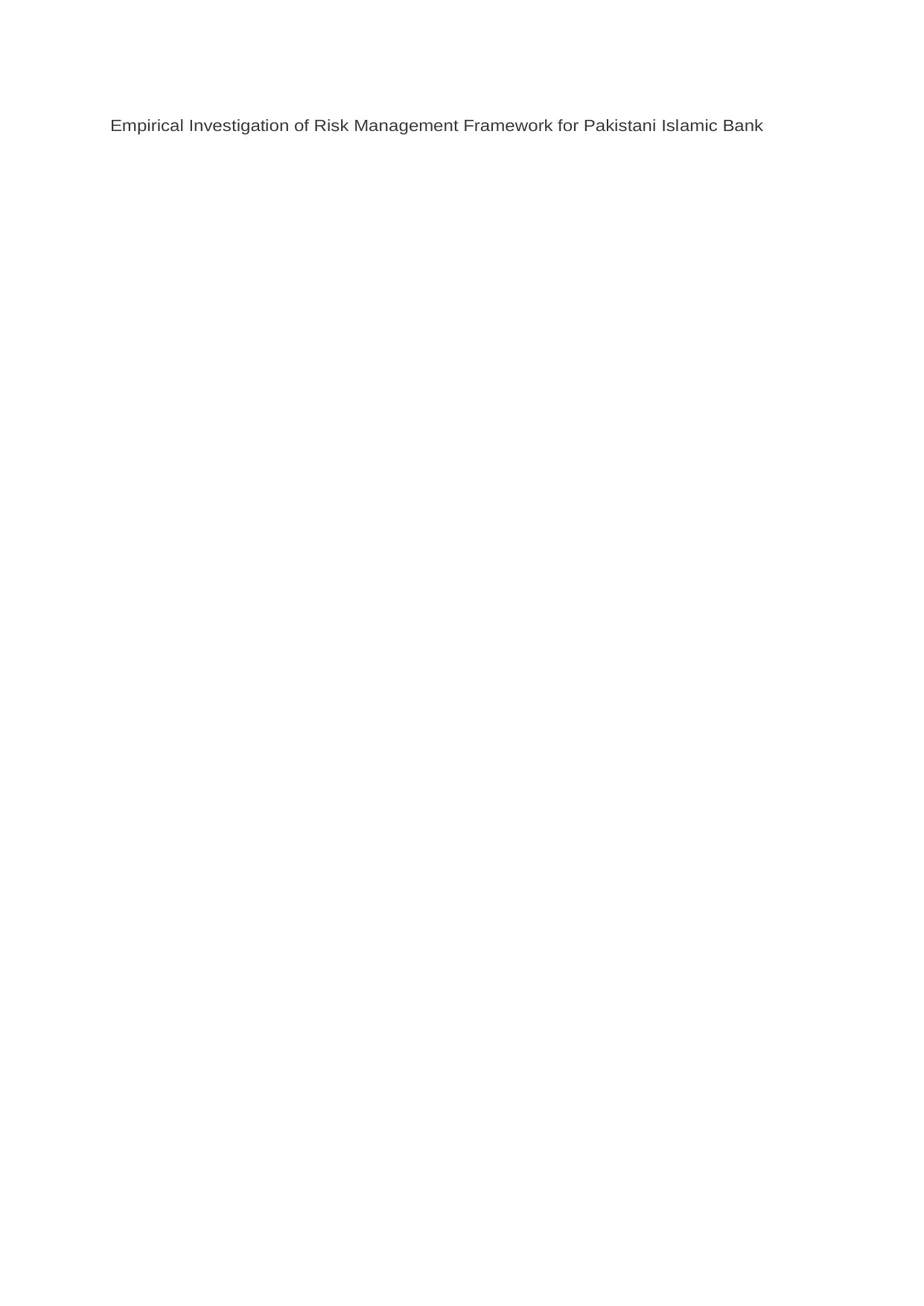
Empirical Investigation of Risk Management Framework for Pakistani Islamic Bank
Paraphrase This Document
Need a fresh take? Get an instant paraphrase of this document with our AI Paraphraser
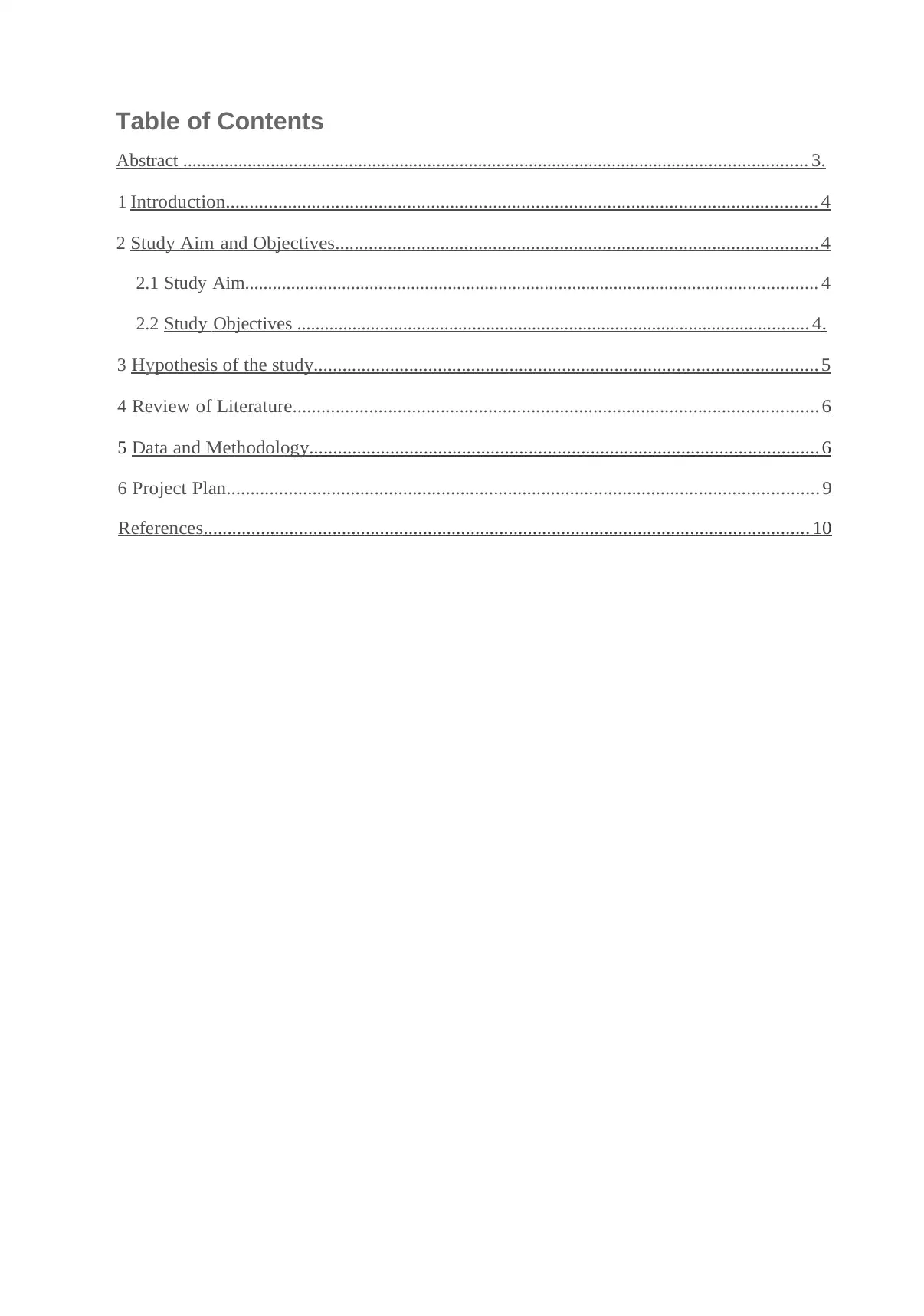
Table of Contents
Abstract ....................................................................................................................................... 3 .
1 Introduction............................................................................................................................ 4
2 Study Aim and Objectives..................................................................................................... 4
2.1 Study Aim............................................................................................................................ 4
2.2 Study Objectives ............................................................................................................... 4 .
3 Hypothesis of the study......................................................................................................... 5
4 Review of Literature.............................................................................................................. 6
5 Data and Methodology........................................................................................................... 6
6 Project Plan............................................................................................................................ 9
References............................................................................................................................... 10
Abstract ....................................................................................................................................... 3 .
1 Introduction............................................................................................................................ 4
2 Study Aim and Objectives..................................................................................................... 4
2.1 Study Aim............................................................................................................................ 4
2.2 Study Objectives ............................................................................................................... 4 .
3 Hypothesis of the study......................................................................................................... 5
4 Review of Literature.............................................................................................................. 6
5 Data and Methodology........................................................................................................... 6
6 Project Plan............................................................................................................................ 9
References............................................................................................................................... 10
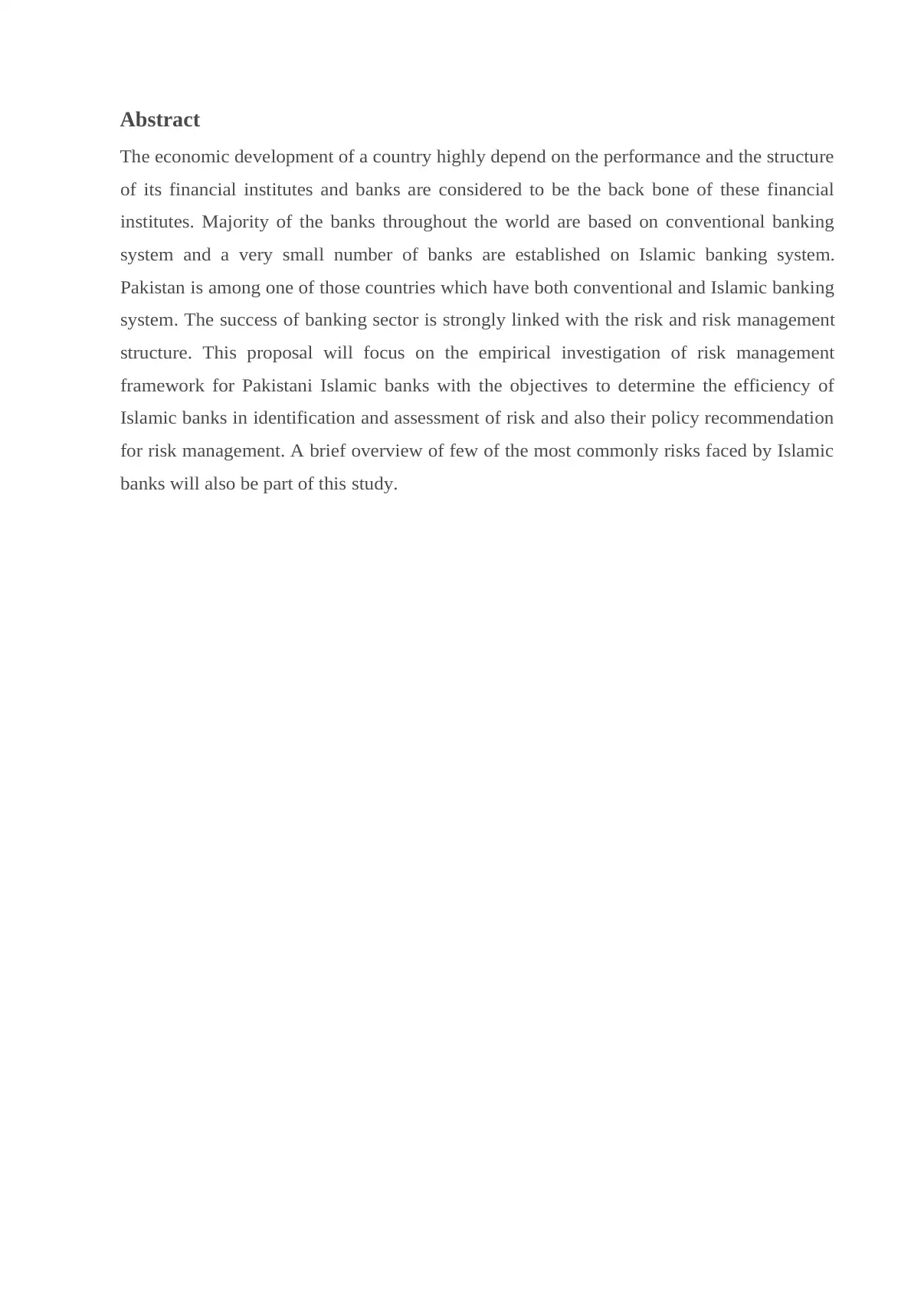
Abstract
The economic development of a country highly depend on the performance and the structure
of its financial institutes and banks are considered to be the back bone of these financial
institutes. Majority of the banks throughout the world are based on conventional banking
system and a very small number of banks are established on Islamic banking system.
Pakistan is among one of those countries which have both conventional and Islamic banking
system. The success of banking sector is strongly linked with the risk and risk management
structure. This proposal will focus on the empirical investigation of risk management
framework for Pakistani Islamic banks with the objectives to determine the efficiency of
Islamic banks in identification and assessment of risk and also their policy recommendation
for risk management. A brief overview of few of the most commonly risks faced by Islamic
banks will also be part of this study.
The economic development of a country highly depend on the performance and the structure
of its financial institutes and banks are considered to be the back bone of these financial
institutes. Majority of the banks throughout the world are based on conventional banking
system and a very small number of banks are established on Islamic banking system.
Pakistan is among one of those countries which have both conventional and Islamic banking
system. The success of banking sector is strongly linked with the risk and risk management
structure. This proposal will focus on the empirical investigation of risk management
framework for Pakistani Islamic banks with the objectives to determine the efficiency of
Islamic banks in identification and assessment of risk and also their policy recommendation
for risk management. A brief overview of few of the most commonly risks faced by Islamic
banks will also be part of this study.
⊘ This is a preview!⊘
Do you want full access?
Subscribe today to unlock all pages.

Trusted by 1+ million students worldwide
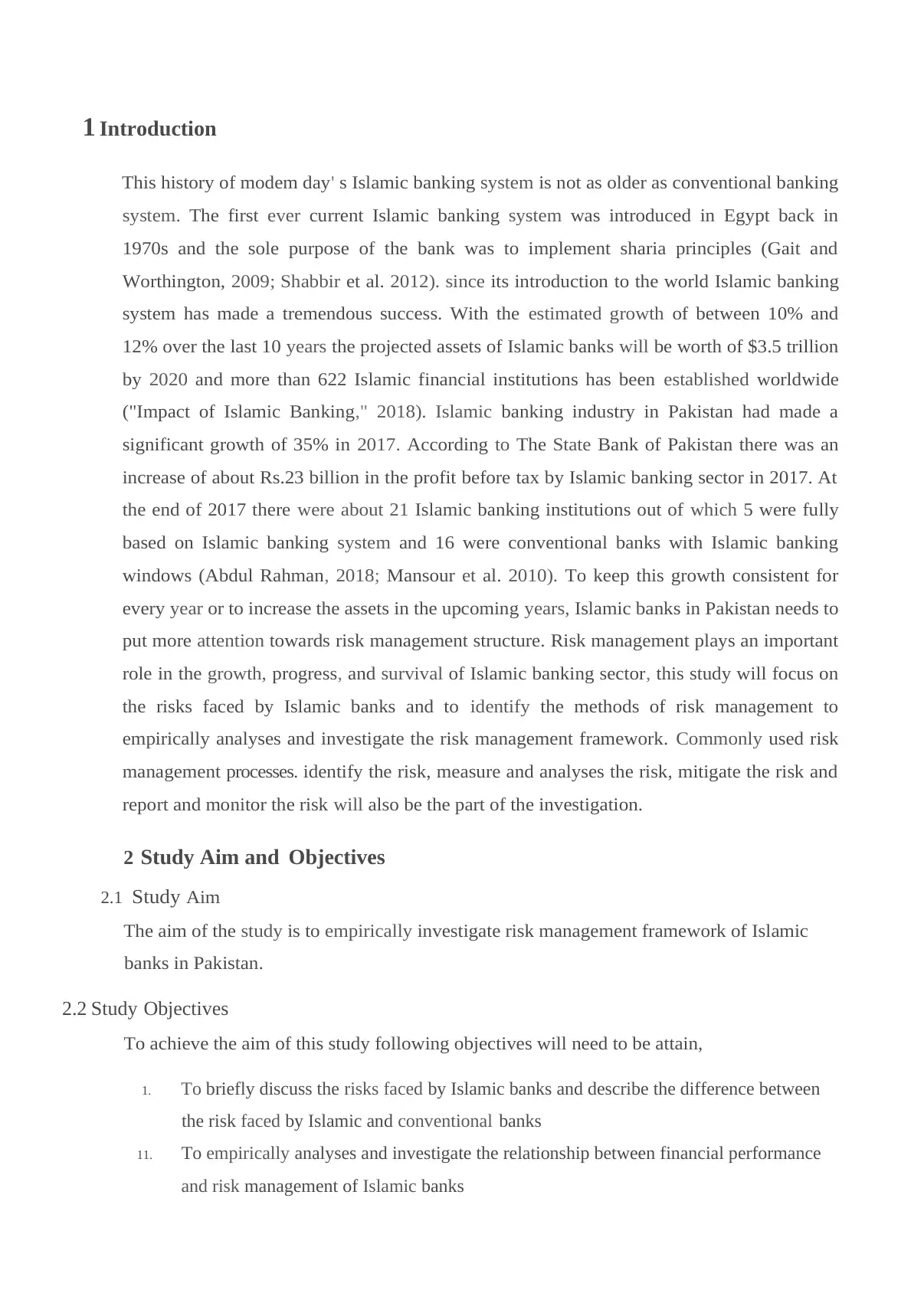
1 Introduction
This history of modem day' s Islamic banking system is not as older as conventional banking
system. The first ever current Islamic banking system was introduced in Egypt back in
1970s and the sole purpose of the bank was to implement sharia principles (Gait and
Worthington, 2009; Shabbir et al. 2012). since its introduction to the world Islamic banking
system has made a tremendous success. With the estimated growth of between 10% and
12% over the last 10 years the projected assets of Islamic banks will be worth of $3.5 trillion
by 2020 and more than 622 Islamic financial institutions has been established worldwide
("Impact of Islamic Banking," 2018). Islamic banking industry in Pakistan had made a
significant growth of 35% in 2017. According to The State Bank of Pakistan there was an
increase of about Rs.23 billion in the profit before tax by Islamic banking sector in 2017. At
the end of 2017 there were about 21 Islamic banking institutions out of which 5 were fully
based on Islamic banking system and 16 were conventional banks with Islamic banking
windows (Abdul Rahman, 2018; Mansour et al. 2010). To keep this growth consistent for
every year or to increase the assets in the upcoming years, Islamic banks in Pakistan needs to
put more attention towards risk management structure. Risk management plays an important
role in the growth, progress, and survival of Islamic banking sector, this study will focus on
the risks faced by Islamic banks and to identify the methods of risk management to
empirically analyses and investigate the risk management framework. Commonly used risk
management processes. identify the risk, measure and analyses the risk, mitigate the risk and
report and monitor the risk will also be the part of the investigation.
2 Study Aim and Objectives
2.1 Study Aim
The aim of the study is to empirically investigate risk management framework of Islamic
banks in Pakistan.
2.2 Study Objectives
To achieve the aim of this study following objectives will need to be attain,
1. To briefly discuss the risks faced by Islamic banks and describe the difference between
the risk faced by Islamic and conventional banks
11. To empirically analyses and investigate the relationship between financial performance
and risk management of Islamic banks
This history of modem day' s Islamic banking system is not as older as conventional banking
system. The first ever current Islamic banking system was introduced in Egypt back in
1970s and the sole purpose of the bank was to implement sharia principles (Gait and
Worthington, 2009; Shabbir et al. 2012). since its introduction to the world Islamic banking
system has made a tremendous success. With the estimated growth of between 10% and
12% over the last 10 years the projected assets of Islamic banks will be worth of $3.5 trillion
by 2020 and more than 622 Islamic financial institutions has been established worldwide
("Impact of Islamic Banking," 2018). Islamic banking industry in Pakistan had made a
significant growth of 35% in 2017. According to The State Bank of Pakistan there was an
increase of about Rs.23 billion in the profit before tax by Islamic banking sector in 2017. At
the end of 2017 there were about 21 Islamic banking institutions out of which 5 were fully
based on Islamic banking system and 16 were conventional banks with Islamic banking
windows (Abdul Rahman, 2018; Mansour et al. 2010). To keep this growth consistent for
every year or to increase the assets in the upcoming years, Islamic banks in Pakistan needs to
put more attention towards risk management structure. Risk management plays an important
role in the growth, progress, and survival of Islamic banking sector, this study will focus on
the risks faced by Islamic banks and to identify the methods of risk management to
empirically analyses and investigate the risk management framework. Commonly used risk
management processes. identify the risk, measure and analyses the risk, mitigate the risk and
report and monitor the risk will also be the part of the investigation.
2 Study Aim and Objectives
2.1 Study Aim
The aim of the study is to empirically investigate risk management framework of Islamic
banks in Pakistan.
2.2 Study Objectives
To achieve the aim of this study following objectives will need to be attain,
1. To briefly discuss the risks faced by Islamic banks and describe the difference between
the risk faced by Islamic and conventional banks
11. To empirically analyses and investigate the relationship between financial performance
and risk management of Islamic banks
Paraphrase This Document
Need a fresh take? Get an instant paraphrase of this document with our AI Paraphraser

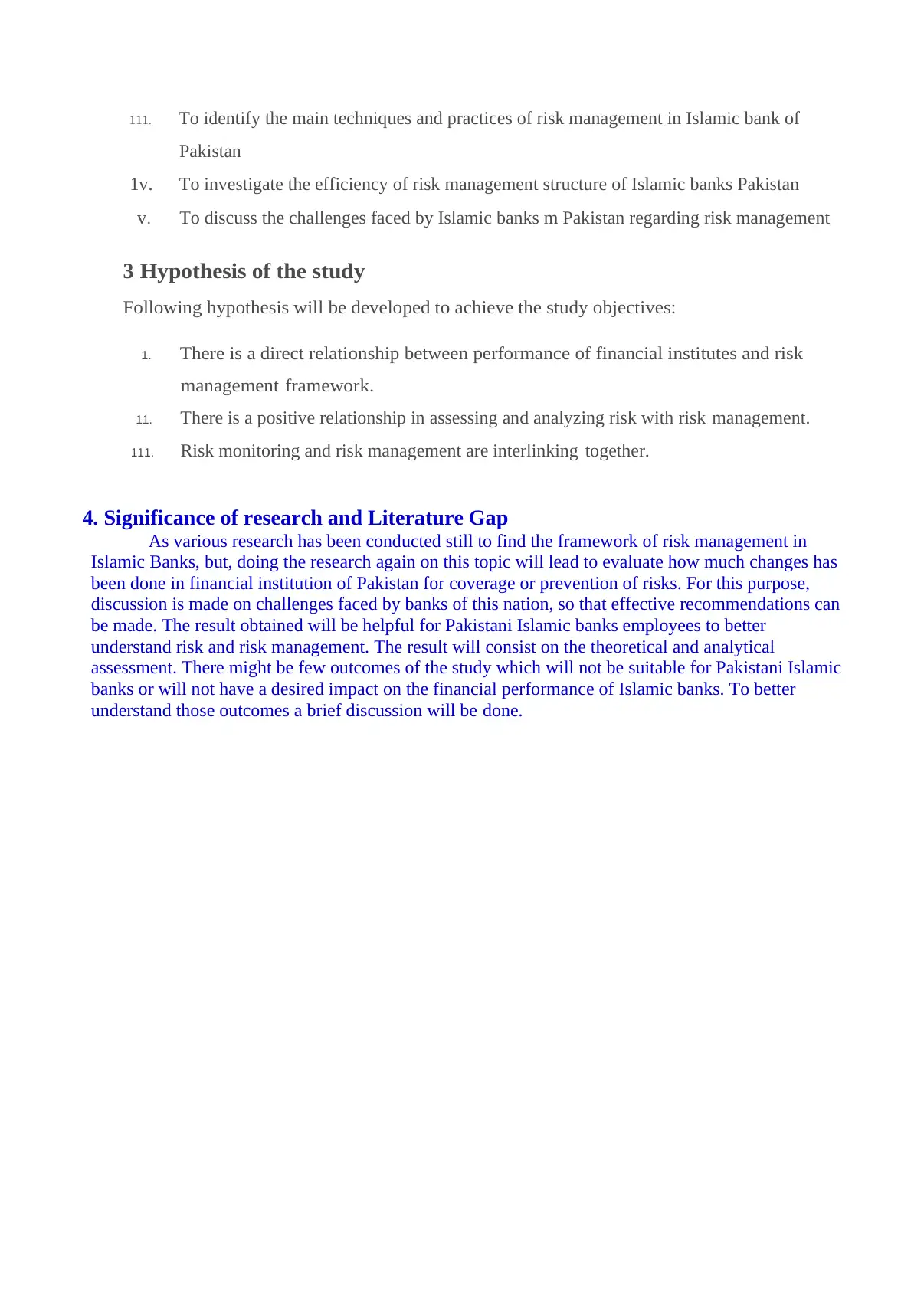
111. To identify the main techniques and practices of risk management in Islamic bank of
Pakistan
1v. To investigate the efficiency of risk management structure of Islamic banks Pakistan
v. To discuss the challenges faced by Islamic banks m Pakistan regarding risk management
3 Hypothesis of the study
Following hypothesis will be developed to achieve the study objectives:
1. There is a direct relationship between performance of financial institutes and risk
management framework.
11. There is a positive relationship in assessing and analyzing risk with risk management.
111. Risk monitoring and risk management are interlinking together.
4. Significance of research and Literature Gap
As various research has been conducted still to find the framework of risk management in
Islamic Banks, but, doing the research again on this topic will lead to evaluate how much changes has
been done in financial institution of Pakistan for coverage or prevention of risks. For this purpose,
discussion is made on challenges faced by banks of this nation, so that effective recommendations can
be made. The result obtained will be helpful for Pakistani Islamic banks employees to better
understand risk and risk management. The result will consist on the theoretical and analytical
assessment. There might be few outcomes of the study which will not be suitable for Pakistani Islamic
banks or will not have a desired impact on the financial performance of Islamic banks. To better
understand those outcomes a brief discussion will be done.
Pakistan
1v. To investigate the efficiency of risk management structure of Islamic banks Pakistan
v. To discuss the challenges faced by Islamic banks m Pakistan regarding risk management
3 Hypothesis of the study
Following hypothesis will be developed to achieve the study objectives:
1. There is a direct relationship between performance of financial institutes and risk
management framework.
11. There is a positive relationship in assessing and analyzing risk with risk management.
111. Risk monitoring and risk management are interlinking together.
4. Significance of research and Literature Gap
As various research has been conducted still to find the framework of risk management in
Islamic Banks, but, doing the research again on this topic will lead to evaluate how much changes has
been done in financial institution of Pakistan for coverage or prevention of risks. For this purpose,
discussion is made on challenges faced by banks of this nation, so that effective recommendations can
be made. The result obtained will be helpful for Pakistani Islamic banks employees to better
understand risk and risk management. The result will consist on the theoretical and analytical
assessment. There might be few outcomes of the study which will not be suitable for Pakistani Islamic
banks or will not have a desired impact on the financial performance of Islamic banks. To better
understand those outcomes a brief discussion will be done.
⊘ This is a preview!⊘
Do you want full access?
Subscribe today to unlock all pages.

Trusted by 1+ million students worldwide

S I P a g e
Paraphrase This Document
Need a fresh take? Get an instant paraphrase of this document with our AI Paraphraser
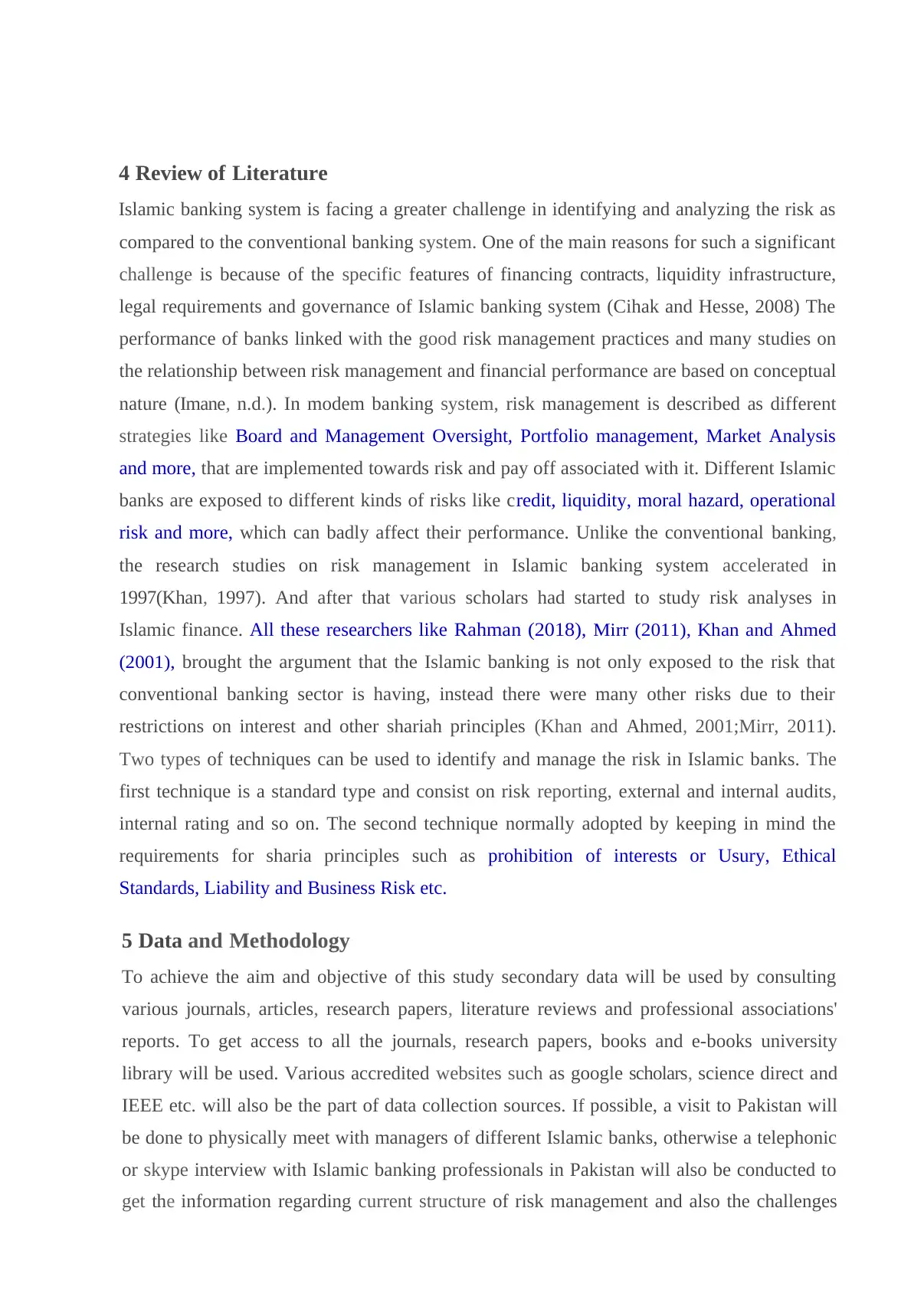
4 Review of Literature
Islamic banking system is facing a greater challenge in identifying and analyzing the risk as
compared to the conventional banking system. One of the main reasons for such a significant
challenge is because of the specific features of financing contracts, liquidity infrastructure,
legal requirements and governance of Islamic banking system (Cihak and Hesse, 2008) The
performance of banks linked with the good risk management practices and many studies on
the relationship between risk management and financial performance are based on conceptual
nature (Imane, n.d.). In modem banking system, risk management is described as different
strategies like Board and Management Oversight, Portfolio management, Market Analysis
and more, that are implemented towards risk and pay off associated with it. Different Islamic
banks are exposed to different kinds of risks like credit, liquidity, moral hazard, operational
risk and more, which can badly affect their performance. Unlike the conventional banking,
the research studies on risk management in Islamic banking system accelerated in
1997(Khan, 1997). And after that various scholars had started to study risk analyses in
Islamic finance. All these researchers like Rahman (2018), Mirr (2011), Khan and Ahmed
(2001), brought the argument that the Islamic banking is not only exposed to the risk that
conventional banking sector is having, instead there were many other risks due to their
restrictions on interest and other shariah principles (Khan and Ahmed, 2001;Mirr, 2011).
Two types of techniques can be used to identify and manage the risk in Islamic banks. The
first technique is a standard type and consist on risk reporting, external and internal audits,
internal rating and so on. The second technique normally adopted by keeping in mind the
requirements for sharia principles such as prohibition of interests or Usury, Ethical
Standards, Liability and Business Risk etc.
5 Data and Methodology
To achieve the aim and objective of this study secondary data will be used by consulting
various journals, articles, research papers, literature reviews and professional associations'
reports. To get access to all the journals, research papers, books and e-books university
library will be used. Various accredited websites such as google scholars, science direct and
IEEE etc. will also be the part of data collection sources. If possible, a visit to Pakistan will
be done to physically meet with managers of different Islamic banks, otherwise a telephonic
or skype interview with Islamic banking professionals in Pakistan will also be conducted to
get the information regarding current structure of risk management and also the challenges
Islamic banking system is facing a greater challenge in identifying and analyzing the risk as
compared to the conventional banking system. One of the main reasons for such a significant
challenge is because of the specific features of financing contracts, liquidity infrastructure,
legal requirements and governance of Islamic banking system (Cihak and Hesse, 2008) The
performance of banks linked with the good risk management practices and many studies on
the relationship between risk management and financial performance are based on conceptual
nature (Imane, n.d.). In modem banking system, risk management is described as different
strategies like Board and Management Oversight, Portfolio management, Market Analysis
and more, that are implemented towards risk and pay off associated with it. Different Islamic
banks are exposed to different kinds of risks like credit, liquidity, moral hazard, operational
risk and more, which can badly affect their performance. Unlike the conventional banking,
the research studies on risk management in Islamic banking system accelerated in
1997(Khan, 1997). And after that various scholars had started to study risk analyses in
Islamic finance. All these researchers like Rahman (2018), Mirr (2011), Khan and Ahmed
(2001), brought the argument that the Islamic banking is not only exposed to the risk that
conventional banking sector is having, instead there were many other risks due to their
restrictions on interest and other shariah principles (Khan and Ahmed, 2001;Mirr, 2011).
Two types of techniques can be used to identify and manage the risk in Islamic banks. The
first technique is a standard type and consist on risk reporting, external and internal audits,
internal rating and so on. The second technique normally adopted by keeping in mind the
requirements for sharia principles such as prohibition of interests or Usury, Ethical
Standards, Liability and Business Risk etc.
5 Data and Methodology
To achieve the aim and objective of this study secondary data will be used by consulting
various journals, articles, research papers, literature reviews and professional associations'
reports. To get access to all the journals, research papers, books and e-books university
library will be used. Various accredited websites such as google scholars, science direct and
IEEE etc. will also be the part of data collection sources. If possible, a visit to Pakistan will
be done to physically meet with managers of different Islamic banks, otherwise a telephonic
or skype interview with Islamic banking professionals in Pakistan will also be conducted to
get the information regarding current structure of risk management and also the challenges
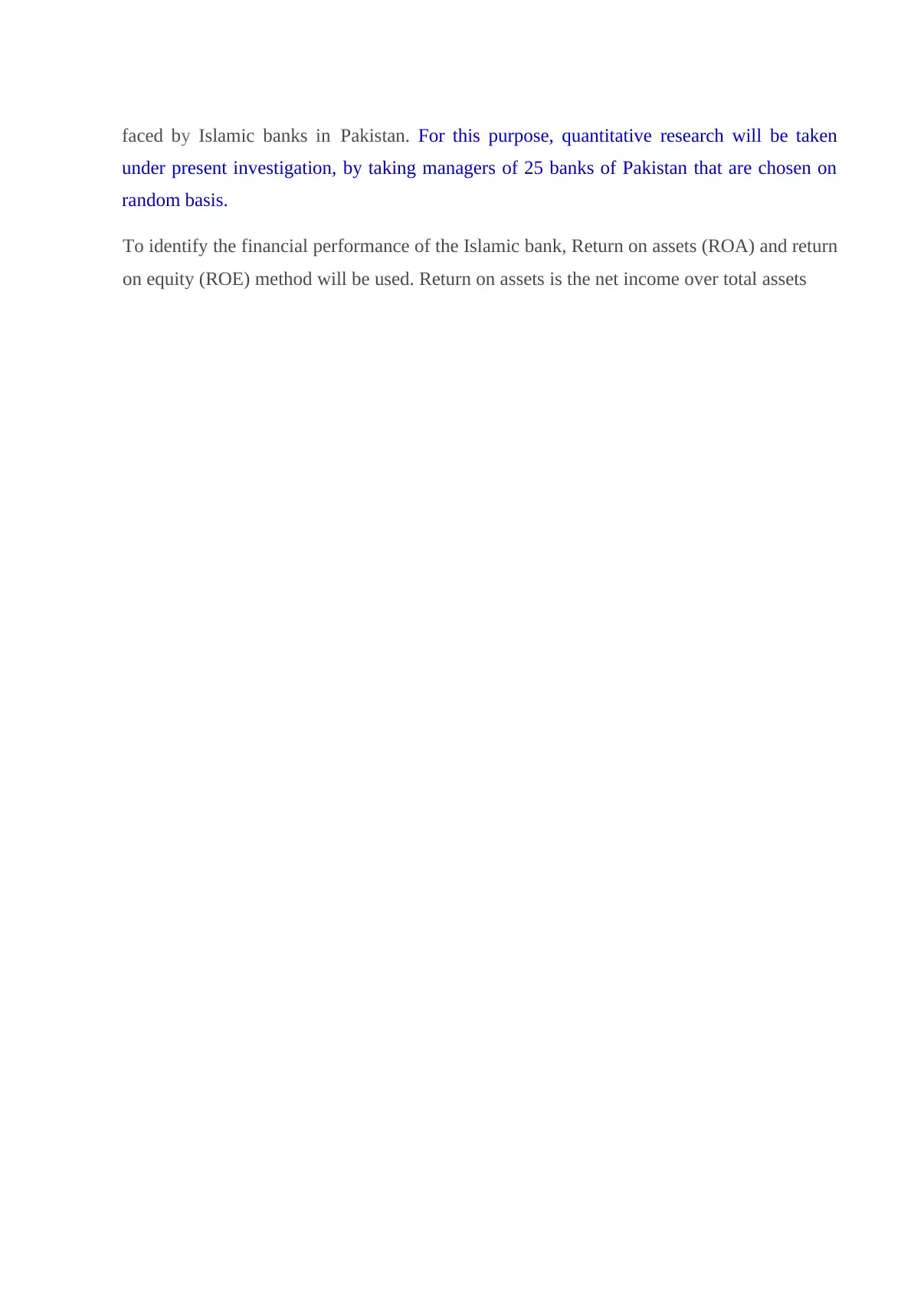
faced by Islamic banks in Pakistan. For this purpose, quantitative research will be taken
under present investigation, by taking managers of 25 banks of Pakistan that are chosen on
random basis.
To identify the financial performance of the Islamic bank, Return on assets (ROA) and return
on equity (ROE) method will be used. Return on assets is the net income over total assets
under present investigation, by taking managers of 25 banks of Pakistan that are chosen on
random basis.
To identify the financial performance of the Islamic bank, Return on assets (ROA) and return
on equity (ROE) method will be used. Return on assets is the net income over total assets
⊘ This is a preview!⊘
Do you want full access?
Subscribe today to unlock all pages.

Trusted by 1+ million students worldwide
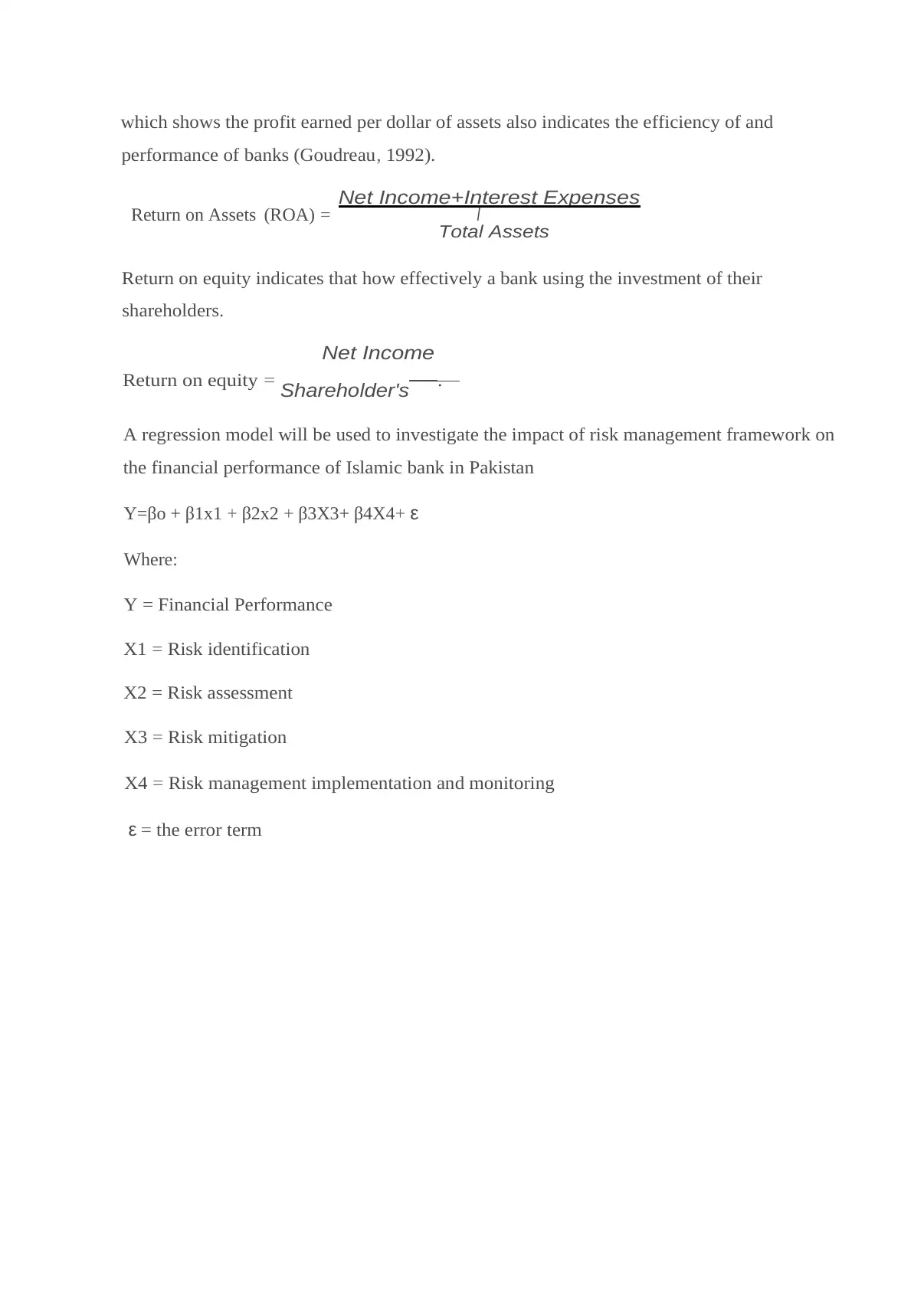
which shows the profit earned per dollar of assets also indicates the efficiency of and
performance of banks (Goudreau, 1992).
Net Income+Interest Expenses
Return on Assets (ROA) = l
Total Assets
Return on equity indicates that how effectively a bank using the investment of their
shareholders.
Net Income
Return on equity = Shareholder's .
A regression model will be used to investigate the impact of risk management framework on
the financial performance of Islamic bank in Pakistan
Y=βo + β1x1 + β2x2 + β3X3+ β4X4+ ε
Where:
Y = Financial Performance
X1 = Risk identification
X2 = Risk assessment
X3 = Risk mitigation
X4 = Risk management implementation and monitoring
ε = the error term
performance of banks (Goudreau, 1992).
Net Income+Interest Expenses
Return on Assets (ROA) = l
Total Assets
Return on equity indicates that how effectively a bank using the investment of their
shareholders.
Net Income
Return on equity = Shareholder's .
A regression model will be used to investigate the impact of risk management framework on
the financial performance of Islamic bank in Pakistan
Y=βo + β1x1 + β2x2 + β3X3+ β4X4+ ε
Where:
Y = Financial Performance
X1 = Risk identification
X2 = Risk assessment
X3 = Risk mitigation
X4 = Risk management implementation and monitoring
ε = the error term
Paraphrase This Document
Need a fresh take? Get an instant paraphrase of this document with our AI Paraphraser
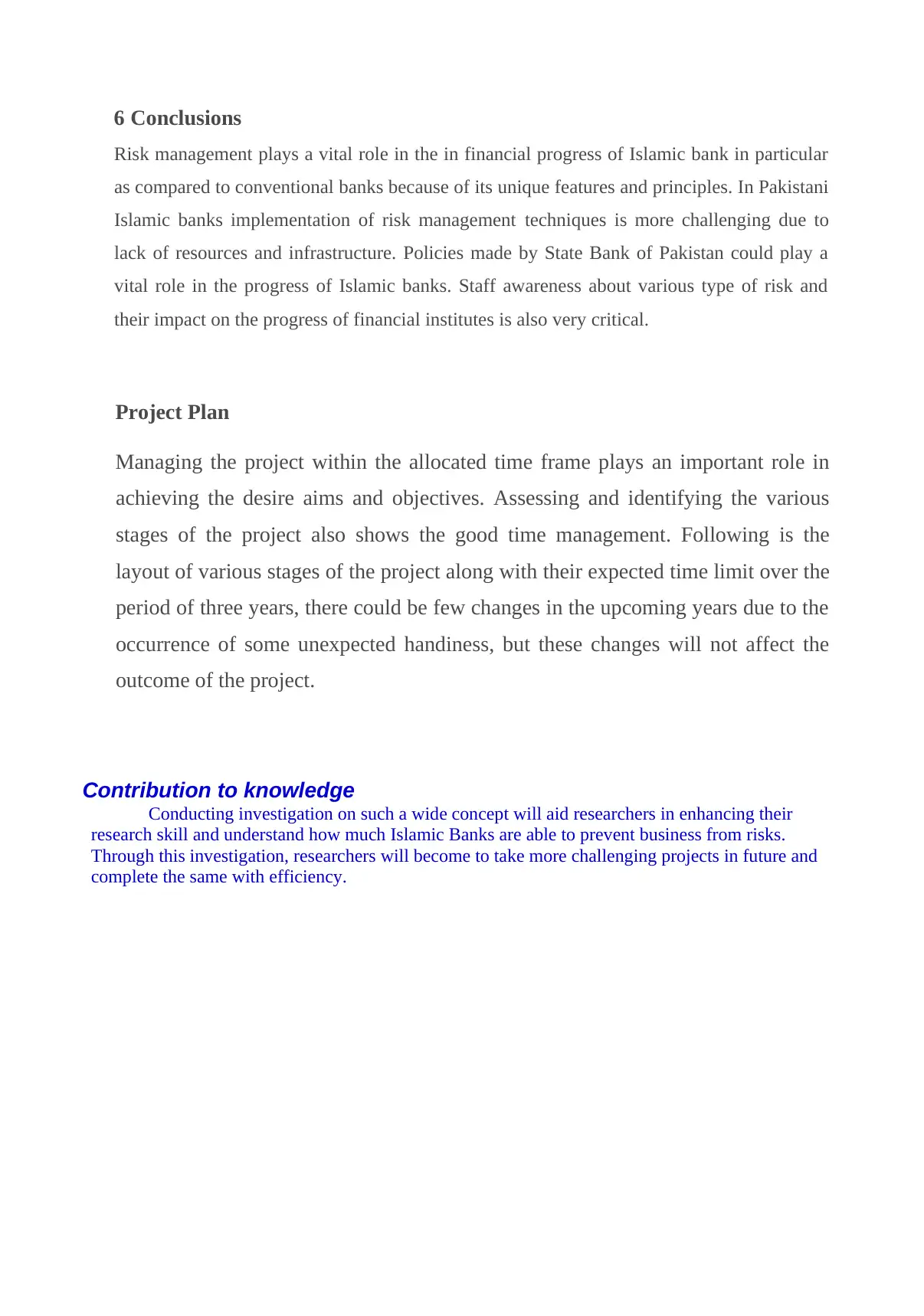
6 Conclusions
Risk management plays a vital role in the in financial progress of Islamic bank in particular
as compared to conventional banks because of its unique features and principles. In Pakistani
Islamic banks implementation of risk management techniques is more challenging due to
lack of resources and infrastructure. Policies made by State Bank of Pakistan could play a
vital role in the progress of Islamic banks. Staff awareness about various type of risk and
their impact on the progress of financial institutes is also very critical.
Project Plan
Managing the project within the allocated time frame plays an important role in
achieving the desire aims and objectives. Assessing and identifying the various
stages of the project also shows the good time management. Following is the
layout of various stages of the project along with their expected time limit over the
period of three years, there could be few changes in the upcoming years due to the
occurrence of some unexpected handiness, but these changes will not affect the
outcome of the project.
Contribution to knowledge
Conducting investigation on such a wide concept will aid researchers in enhancing their
research skill and understand how much Islamic Banks are able to prevent business from risks.
Through this investigation, researchers will become to take more challenging projects in future and
complete the same with efficiency.
Risk management plays a vital role in the in financial progress of Islamic bank in particular
as compared to conventional banks because of its unique features and principles. In Pakistani
Islamic banks implementation of risk management techniques is more challenging due to
lack of resources and infrastructure. Policies made by State Bank of Pakistan could play a
vital role in the progress of Islamic banks. Staff awareness about various type of risk and
their impact on the progress of financial institutes is also very critical.
Project Plan
Managing the project within the allocated time frame plays an important role in
achieving the desire aims and objectives. Assessing and identifying the various
stages of the project also shows the good time management. Following is the
layout of various stages of the project along with their expected time limit over the
period of three years, there could be few changes in the upcoming years due to the
occurrence of some unexpected handiness, but these changes will not affect the
outcome of the project.
Contribution to knowledge
Conducting investigation on such a wide concept will aid researchers in enhancing their
research skill and understand how much Islamic Banks are able to prevent business from risks.
Through this investigation, researchers will become to take more challenging projects in future and
complete the same with efficiency.

⊘ This is a preview!⊘
Do you want full access?
Subscribe today to unlock all pages.

Trusted by 1+ million students worldwide
1 out of 13
Related Documents
Your All-in-One AI-Powered Toolkit for Academic Success.
+13062052269
info@desklib.com
Available 24*7 on WhatsApp / Email
![[object Object]](/_next/static/media/star-bottom.7253800d.svg)
Unlock your academic potential
Copyright © 2020–2026 A2Z Services. All Rights Reserved. Developed and managed by ZUCOL.





